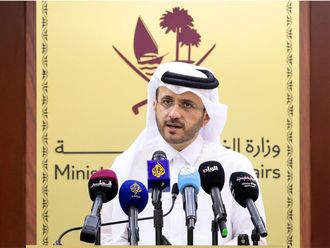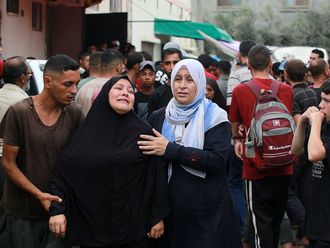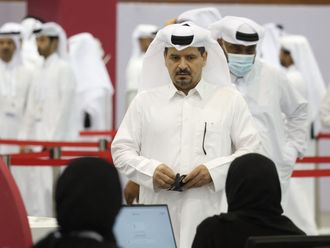Manama: Shaikha Moza Bint Nasser Al Misned, Chairperson of Qatar Foundation for Education, Science and Community Development (QF), has called for revitalising Arabic as a language to ensure it is not marginalised.
"One of the great challenges in the Arab world is the Arabic language," she said. "The Arabic language is poetic, but it risks being marginalised because it has not modernised to meet today's challenges. We need to revitalise the language," Shaikha Moza said in the Italian capital, Rome, following a presentation of Loghati, an integrated e-communications solution developed by Qatar Science & Technology Park (QSTP).
Shaikha Moza attended the unveiling of Loghati in Rome.
During the presentation, a demonstration of Loghati showed how it can facilitate the publishing of multilingual versions for all written text and foster unprecedented cross-cultural exchange and collaboration between researchers, academics and institutions, which helps build the foundation for a knowledge-based society.
"The Arab tradition for transferring knowledge, particularly among Bedouin people, was by word of mouth and the direct interaction between people," Tidu Maini, Science and Technology Advisor and Chairman of QSTP, said. "Loghati is the 21st century version of this tradition. This platform allows anyone to interface directly and seamlessly with great Arab works from anywhere in the world."
QSTP has signed a Memorandum of Understanding (MOU) with partners in Italy that will launch a series of projects to demonstrate the influence of Arab culture on Western culture. The use of the Loghati platform will facilitate new research, develop new works and publish new books.
Loghati - My language in Arabic - allows the creation of virtual libraries comprised of ancient and modern texts, where each document is a multi-dimensional information repository that can be accessed, amended, instantly translated from Arabic into other languages and back. Loghati also has the ability to host audio and video content in its virtual library, creating a multimedia interface for knowledge previously unavailable to millions.
Loghati was developed by QSTP and it is the second homegrown technology outside the energy sector developed in Qatar and commercialised internationally. The integrated system is built upon an innovative architecture of artificial intelligence.
Scholars, semantics experts, and government officials praised Loghati's potential to bridge communication between people of diverse nationalities and to preserve and promote great works that would otherwise be unshared due to language barriers.
The Galileo Museum in Florence has big plans.
"The language that will be used in the museum is interactive, relying significantly on information technology," Professor Paulo Galluzzi, Director of the museum and Professor of the History of Science at the University of Florence, said. "Of course the fantastic Loghati platform developed by QSTP provides the ideal opportunity to spread throughout the world all the achievements by the Arab civilisation. I have seen the Loghati platform at work and have been very impressed. I have been exposed to IT in the last twenty years and can see the very high level of contributions that Loghati will provide to improving communication and understanding between cultures."
Loghati will help to preserve the Arabic language through the publication of information in several formats, such as scientific books and other new works. Giunti Publishing House, publisher of Pinocchio, discussed how it would make sure Loghati projects are sustainable, by creating publications, books and e-books with the outcomes of the research using the technology.
"Our publishing group is very interested in building a bridge between west and east - Italy and Qatar - through culture, science and education," said Dr. Sergio Giunti, Chairman of Giunti Publishing House. "Loghati will help us to exchange experiences, to share knowledge, to enhance friendship, to highlight the deep-rooted relations between the Italian and Arabic world, as well as to build partnerships."
The Universita Orientale Napoli, the world's oldest state university, will use the Loghati platform to enable the promotion and exchange of information related to preserving cultural heritage.
Hundreds of manuscripts and documents of Arabic text, most of which are unknown to the world, lie in the archives of the university. Loghati will be used to digitize and translate these manuscripts on Arab culture and innovation and in doing so provide a new platform for shared learning and discovery.
The European Center for Study on Normans (CESN) is also partnering with QSTP and will use Loghati for research activities on the history of the Normans and their relationships with the Arab world.
The first known example of such cooperation has been the translation of a book on falconry titled ‘De Arte Venandi Cum Avibus' written by Frederic II, Roman Emperor and founder of the University of Naples.
CESN will use Loghati to facilitate research studies on the works of Arab and Medieval Latin culture.












